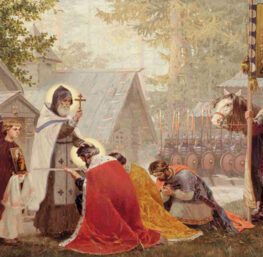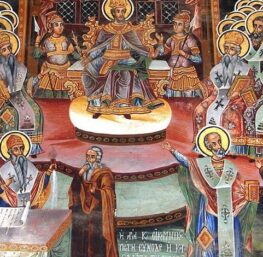Real Clear Politics | David Warren | Julu 15, 2007
For the great atheist-socialist ideologies of the 20th century worked against the grain of the societies upon which they preyed, and were for that reason easier to throw off. The deep Christian traditions of e.g. Germany, Italy, and Russia were against them from the beginning, and the claims they made on behalf of a new moral order — inverted from the old — struck the European mind as false and finally, uninspiring.
Lee Harris is among the few living writers who do not, as the saying goes, “subtract from the sum total of human knowledge” with each new essay. I’ve puffed him before, and will puff him again, the more shamelessly in the knowledge that his new book, The Suicide of Reason, is probably not even available in Canada.
As usual, Mr Harris is skiing uphill against the assumptions his American countrymen and others through the West have brought into the inaptly-named “war on terror.” We seem incapable of projecting ourselves, even cursorily, into the mind of our mortal enemy, and the language we use to describe him, even when it is not cowardly and politically correct (“supporters” of Al Qaeda, “militants,” etc.), conceals more than it reveals. Even in clearer, less compromised writing, the enemy is presented as un-adjectived “fanatics,” or “terrorists” — which they are, but the terms do not get us any closer to their motivations.
“Islamists” — an abbreviation I use, and explain from time to time, and which has at least the virtue that it is acceptable to both the enemy himself, and most of that enemy’s Muslim critics — is also ultimately misleading. With considerable decorum and restraint, Mr Harris goes to the trouble of reminding that it is impossible to present the tenets of the Taliban, Al Qaeda, Hamas, or the Muslim Brotherhood on the Sunni side; or of Hezbollah, Iraq’s blackshirts, or Iran’s revolutionary ayatollahs on the Shia side; as complete aberrations of Islam. They do quote Koran and Hadiths accurately enough, and they evoke a semi-legendary history of armed Jihad and conquest that resonates among unwesternized Muslim listeners.
This is what makes the ideology of “Islamism” different in kind from Nazism and Communism, and will, over the coming decades or centuries, make it a more formidable opponent.
For the great atheist-socialist ideologies of the 20th century worked against the grain of the societies upon which they preyed, and were for that reason easier to throw off. The deep Christian traditions of e.g. Germany, Italy, and Russia were against them from the beginning, and the claims they made on behalf of a new moral order — inverted from the old — struck the European mind as false and finally, uninspiring.
Indeed, much of the work distracting Lenin, Stalin, Hitler, consisted of suppressing established institutions and apolitical groups in their own countries, that threatened to undermine them simply because they represented decency and civilization. And when the Nazis and Soviets, respectively, collapsed, they collapsed utterly.
Americans, and other English-speaking peoples, had enough trouble trying to grasp what made Nazis and Communists tick. They were fanatics, to be sure, yet even they could speak, to some degree, the “common European language” of reason and self-interest, and to that degree could be bargained with.
With “Islamism,” we encounter an ideology that goes not against, but with the grain of the society on which it preys, and makes its appeal to that society’s ancient aspirations. Mr Harris is hardly alone in noticing that, but nearly alone in explaining coherently why we Western children of the Enlightenment, and especially his fellow American liberal individualists and exceptionalists, are peculiarly ill-equipped to defend against it.
He does this by showing that Islam is not unique in creating a social order in which zealotry or “fanaticism” is a glue, rather than a solvent. For this has generally been true of non-Western societies, and was universally true of all tribal arrangements that preceded the development of urban culture. We are not dealing with an anomaly, as our use of that word “fanatic” would suggest, but with an alien social order that is perfectly viable on its own turf, and within its own terms, whose premises are entirely non-Western.
We in the West, and especially we in such places as North America and Australia, have lived so long and so comfortably with the contrary premises, that we cannot look at the enemy without translating his behaviour into what is familiar to us. We imagine him to be playing by our rules, even when he is obviously not. We dream about “negotiating.” We suffer hallucinations in which we describe the means and ends of the Jihadists in our own political vocabulary of give-and-take. We have been made myopic by the very success and endurance of our own social order, forgetting that it is itself a fluke of history.
There is no inevitable progress in this world towards democracy and the rule of law. And there is no law of nature that ensures the triumph of reason over zealotry. Reason itself demands that we rethink the defence of reason.




I think this is correct. However, I think western culture has always been aware that “reason” does not stand on it’s own. Only modern, “progressive” man has elevated “reason” to it’s height, or rather lowered it to be some sort of self asserting ground (along with materialism) that the modern walks on. The “I think, therefore I am” is a rather modern subjective turn in the history of Reason.
Will liberal, “progressive” man revisit his roots and thus his forgotten origins? I doubt it…
What is the alternative to reason? Magical thinking, superstition, dogma and mythology. Embracing such an approach represents a retreat back to the middle ages, and brings with it all of the chaos, violence and havoc of that time, which is also known as the “Dark Ages.”
Indeed, those who wish to employ such an approach regarding relations between Christians and Muslims are inviting a return to chaos, violence and havoc. There are moderate, peaceful Muslims who we could work with to marginalize radical Islamic fundamentalism and minimize the attraction of that ideology. However, because we are sinfully proud and arrogant we would rather to portray the Muslim religion as far removed from our own as possible on the scale of good-to-evil, to make ourselves look that much better by comparison. Because we are so insecure in our faith we cannot admit that any other religion, has even the slightest positive attribute. We are terrified that somehow Christianity’s exclusive lock on Salvation will be compromised if we admit that there a single Muslim who is a person of virtue and good will. if God is good how can he send a person of virtue and good will to hell? He can’t, so all Muslims must be bad.
If we used the intellectual faculties that God gave us we would see that there are other forces at work having nothing to do with religion that is driving a lot of the violence emanating from the Middle-East and Central Asia. These include repressive political regimes, a sense of humiliation, ignorance and poverty. Several million Muslims have come to the United States where they live peaceful, contented lives and do interpret their religion to mean they should commit acts of violence to forcefully convert others. Are they all apostates? Or are they able to practice their religion free of the extraneous social, political and economic forces that drive the more violent expressions of faith, elsewhere?
Christ commands us to work for peace in the world, no matter how difficult. Those Christians who refuse to try because because they would rather embrace magical thinking, superstition, dogma and mythology are in rebellion against their Savior.
Dean asks: “What’s the alternative to reason?”
Well, without the use of reason, one must end up forming ideas and conclusions based on one’s personal whims and fancies it seems. Of course, it’s pretty hard to argue with someone who insists they’re right because “they say so”, and I think shutting off discussion seems to be the goal for some. When I ask some here for how they come to the conclusions they do (even within an Orthodox framework), I’m told I’m being a “modernist”.
To give you an example: many, many paragraphs have been written here about Orthodox “anthropology”. That is, the view of man as more than a mere product of chance and biochemical reactions. I have no quarrel with that, and I don’t think any posters here will insist that man is little more than “animated beef with legs”. However, I don’t see how one starts at point “a” (that anthropology) to the whole set of ethical constructs some here feel to be so self-evident. Sure, references are given, but none that really provide a means of how we are to arrive at the various statements of moral condemnation that many seem to have no difficulty in using. They merely underline and acknowledge the presuppositions of the anthropology we’re starting from without identifying how we arrive at point “b”.
This arbitrary (actually, nonexistent) system of defining ethics creates the sort of irrationality you see when Christopher states that removing a feeding tube from someone with little (or no) vital signs is wicked and evil while insisting that refusing to part with a fingernail to save the life of 100 living beings is quite acceptable.
Perhaps he was joking, I don’t know. I hope so.
In any rate, faith may require more than reason, but I don’t think it should be arrived at in defiance of reason. After all, is not reason a God-given faculty?
What is the alternative to reason? Magical thinking, superstition, dogma and mythology.
No, other types of reason.
Indeed, those who wish to employ such an approach regarding relations between Christians and Muslims are inviting a return to chaos, violence and havoc.
Not at all, because Mr. Warren is not suggesting an alternative to reason, he is in fact suggesting we defend it (thus the title).
You see, to a Muslim, it is entirely reasonable to kill you. You can cry “that’s not reasonable” all day long, and project you wish for the muslim to reason like yourself (convert him to your philosophy) but it simply will not work. In other words, you are arguing for conversion. Warren is asking what if we can’t convert the muslim world, what then? What is reasonable then? You argue that “violence” and “chaos” is the only alternative – Warren is asking are there other reasonable alternatives.
However, because we are sinfully proud and arrogant….He can’t, so all Muslims must be bad.
Read Warren again. This is you doing EXACTLY what he says:
“we Western children of the Enlightenment, and especially his fellow American liberal individualists and exceptionalists, are peculiarly ill-equipped to defend against it….We are not dealing with an anomaly, as our use of that word “fanatic” would suggest, but with an alien social order that is perfectly viable on its own turf, and within its own terms, whose premises are entirely non-Western.”
First, you posted this on the wrong thread JamesK. Allow me to respond here, but if you reply, please take it to the correct thread – I will continue there as well.
Perhaps he was joking, I don’t know. I hope so.
Nope, not a joke at all – I am quite serious.
I see your point about not being able to see a clear line from Orthodox anthropology, to a “system of ethics” that allows one to insert question “a”, and get to answer “b”. Perhaps it is like comparing a person with full vision to a color blind person (I happen to be red/green color blind to a certain degree). I used to ask my mother when I was a child “Why do they call green lights green lights?”. How does one describe “green” to a person who can not see “green”?
Perhaps, but not quite, because anyone can “get” Orthodox (which is really just classical Christian) anthropology. As Michael pointed out, Classical morality does not really lead to a “system of ethics”, where you can plug in “a” and get to “b” in clear, unambiguous, terms. That is really a modern wish, coming from a mind that believes morality should be similar to mathematics, the physical sciences, etc. This is not a “Christian” observation. Have you ever read any Plato or Aristotle JamesK?? If so, can you imagine trying to put Socrates into a “system”?? That said, it is clear to me that Terri should not have been executed in the manner she was. Using classical Christian anthropology, she was still “Terri” (i.e. did not “die” in 1993), she was still server her family and her God (even Michael, who struggled all those years to kill her), the state did not need to execute her.
Ask yourself, are you “sacred” – do you have eternal value?
If yes, what are you – what is your “body” in relation to your “mind” in relation to your “soul”?
If they are related, then is your body “sacred”?
If yes, then what is your moral and spiritual state when your are “PVS”? What is the “value”, or worth of “you the body” when “you the mind” appears to be “dead”, or “disabled”, or “departed”? Can “you” the “you” who you are, be something other than “you” when your brain is “PVS”?
I would be interested in your answers…
Well, let me work backwards.
When we die, we are said to be “no longer there”. That is, the element that makes us the eternal and unique ‘us’ is gone. We certainly hold a reverence for the material body that was joined to the spiritual element and which is proper. We hold funeral rites and respectfully place the body in the ground. However, we don’t say that the body WAS the person and so the person is no more. No, those with even a simplistic view of the supernatural say that the essence still exists (though people will differ in opinion in terms of where or in what state). If the duration of one’s existence determine’s worth, then yes we have “value”, although I think the Orthodox will say that animals, too, have some degree of value as God’s creation, though their existence is not eternal.
Now, the difficulty is determining what makes someone obviously “alive” and what makes someone obviously “dead”. We know what this means in religious terms (the person is in Heaven), but that does us no good because we have no way of determining that, short of having some knowledge of the supernatural realm (and I’m not Miss Cleo).
Medical professionals will tell you that even after the respirator is turned off and the time of death is declared, some biological processes will continue for some time. We don’t just turn immediately into stone. Calcium ions leak into muscle cells, muscles stiffen but the cells can live on for several hours, skin cells remain alive for days, etc. Does this mean the person is “alive”? At some point, medical technology may be able to keep someone in this state without decomposing for an indefinite amount of time. Does this mean the person isn’t “dead”?
My point is that some of you don’t seem to like the fact that we are reliant upon medical definitions to specify the parameters of life and death. Given that the only other option is a Ouija board, I’m not sure how else we are to determine these things.
Let me respond on the correct thread…
Just posted on the other thread, but like many of my posts it is “awaiting moderation” so it does not appear on the left – it is in the thread however